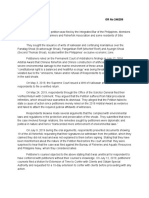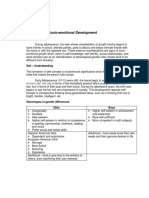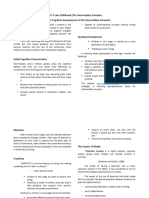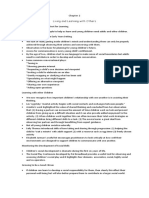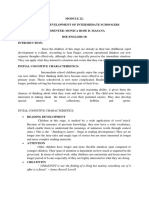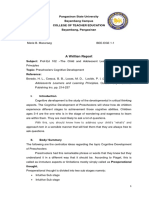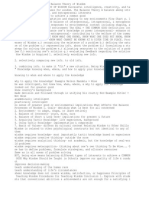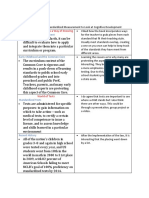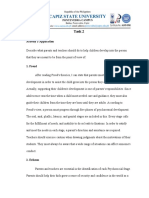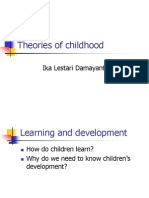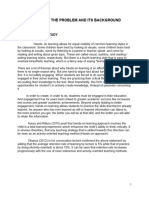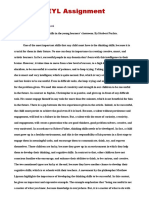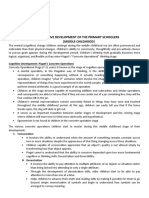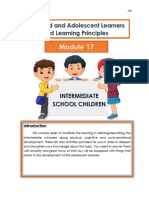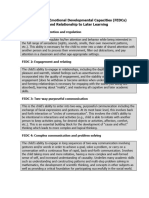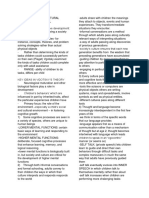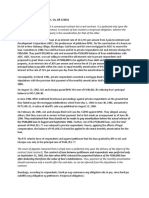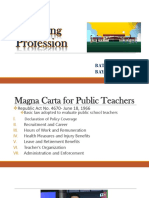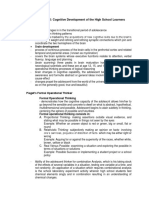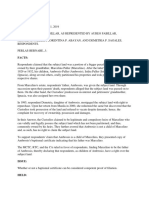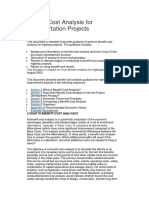MODULE 22: Cognitive Development of Intermediate Schoolers: Longer Span, Interest Is Necessary)
MODULE 22: Cognitive Development of Intermediate Schoolers: Longer Span, Interest Is Necessary)
Uploaded by
Darlyn BangsoyOriginal Description:
Original Title
Copyright
Available Formats
Share this document
Did you find this document useful?
Is this content inappropriate?
Report this DocumentCopyright:
Available Formats
MODULE 22: Cognitive Development of Intermediate Schoolers: Longer Span, Interest Is Necessary)
MODULE 22: Cognitive Development of Intermediate Schoolers: Longer Span, Interest Is Necessary)
Uploaded by
Darlyn BangsoyCopyright:
Available Formats
MODULE 22: Cognitive development of intermediate schoolers
INTERMEDIATE SCHOOLERS "Children in this stage are already in their late
childhood.”
Concrete operational Thinker can now organize thoughts effectively, logically
perceive the immediate situation, applies what they have learned to
situations and events, they can manipulate. OPERATIONS to refer to reversible
abilities that the child has not yet developed. By reversible, Piaget referred to
mental or physical actions that can occur in more than one way, or in differing
directions. While in the concrete operations stage, older children cannot think
both logically and abstractly.
Initial cognitive characteristics
their thinking skills have become more effective as compared during their
primary years.
They already have the ability to use LOGIC and REASONING but still can't
grasp abstract ideas.
Starts to develop an interest in their future, hobbies, and sports.
Capable in comprehending concepts even without first-hand experience
Reading development
Know the meaning of unknown words through context clues (WORD
ATTACK) thus they widen their vocabulary.
They are no longer into fairytales and more into complex reading materials
(e.g. fictions and series)
Attention (10-12 minutes, little evidence that their brains can be trained to develop a
longer span, interest is necessary)
Older children have longer and more flexible attention span compared to
younger children.
Span of attention is dependent on how much is required by the task at hand
Creativity
This is the stage wherein they are very investigative and exploratory of their
surroundings.
Natural in every child it just needs a little guidance and support from parents
teachers and society.
Creativity in children is encouraged when the activities:
Encourage different responses from each child.
Celebrate uniqueness
Value process over product.
Reduced stress and anxiety in children.
Support to share ideas, not only with teacher/parents but also with
other children.
Minimize competition and external rewards.
The Impact of Media
It was considered as one of the first technological advancement in school.
The influence of the use of television and computer has gained popularity
because the students are given more opportunity to:
Communicate writing. effectively in speech and
Work collaboratively
Use technological tools
Analyze problems, set goals, and formulate strategies for achieving
those goals.
Seek out information or skills on their own, as needed, to meet their
goals.
Media and Aggression
Violence and aggression are often dubbed as one of the result of media.
Negative results of media:
increases anti-social and aggressive behavior.
may become less sensitive to violence and those who suffer from
violence.
may view the world as violent and mean, becoming more fearful of
being a victim of violence.
children will desire to see more violence in entertainment and real
life.
children will view violence as an acceptable way to settle conflicts.
Role of Teachers
Need to be eager participants in children’s growth and development
Must understand how to use the children’s natural curiosity to help make the
appropriate developmental leaps in their skills and abilities.
Must create an atmosphere where risks can be taken and discoveries made
while children remain safe.
You might also like
- Abogado, Et Al Vs DENR GR No 246209 FactsDocument6 pagesAbogado, Et Al Vs DENR GR No 246209 FactsDarlyn BangsoyNo ratings yet
- Vocabulary Quiz 2 Group B: PhoneDocument2 pagesVocabulary Quiz 2 Group B: PhoneFLAME TM100% (2)
- Whistle-Blower's Letter To Congressional LeadersDocument16 pagesWhistle-Blower's Letter To Congressional LeadersJeffrey DunetzNo ratings yet
- Developmental Reading 2Document53 pagesDevelopmental Reading 2Maria Francessa Abat84% (32)
- Maria MontessoriDocument5 pagesMaria Montessoriniwdle1No ratings yet
- Saura Import and Export Co. vs. DBP 44 SCRA 445Document1 pageSaura Import and Export Co. vs. DBP 44 SCRA 445Darlyn BangsoyNo ratings yet
- Saura Import and Export Co. vs. DBP 44 SCRA 445Document1 pageSaura Import and Export Co. vs. DBP 44 SCRA 445Darlyn BangsoyNo ratings yet
- Acme Shoe Rubber vs. CA 260 SCRA 714Document2 pagesAcme Shoe Rubber vs. CA 260 SCRA 714Darlyn BangsoyNo ratings yet
- LTS Project ProposalDocument2 pagesLTS Project ProposalDarlyn Bangsoy50% (2)
- MODULE 26: Socio-Emotional Development: Self - UnderstandingDocument2 pagesMODULE 26: Socio-Emotional Development: Self - UnderstandingDarlyn Bangsoy100% (1)
- 4 PDFDocument2 pages4 PDFapudutta007No ratings yet
- Strategic Analysis of General ElectricDocument6 pagesStrategic Analysis of General ElectricShamim Waheed100% (2)
- Cognitive Development of The Intermediate SchoolersDocument8 pagesCognitive Development of The Intermediate SchoolersBlog Asia100% (4)
- Module 22 Cognitive Developmeny of The Intermediate SchoolersDocument4 pagesModule 22 Cognitive Developmeny of The Intermediate Schoolersalmeanantone4No ratings yet
- MODULE22 HandoutDocument4 pagesMODULE22 HandoutAnne Mari Page PasenciaNo ratings yet
- Educ 1Document28 pagesEduc 1Charen ReposposaNo ratings yet
- Finals Lesson 2 Cognitive Development of Intermediate SchoolersDocument4 pagesFinals Lesson 2 Cognitive Development of Intermediate SchoolersBeth Sai50% (2)
- Assignmentt 4Document12 pagesAssignmentt 4manjotkaursandhu371No ratings yet
- Child and Adolescent DevelopmentDocument20 pagesChild and Adolescent DevelopmentLouise Ann BersaminNo ratings yet
- Assignmentt 3Document14 pagesAssignmentt 3manjotkaursandhu371No ratings yet
- Module 22 Cognitive Development of Intermediate Schoolers Group 4Document14 pagesModule 22 Cognitive Development of Intermediate Schoolers Group 4Nikka Zayra Buela76% (17)
- Course-Module - Educ 1 Week 14Document26 pagesCourse-Module - Educ 1 Week 14DarcknyPusodNo ratings yet
- Field Study 6: Activity 19: Teacher As A PersonDocument15 pagesField Study 6: Activity 19: Teacher As A PersonFionna LazoNo ratings yet
- Child Cluster 1 & 2Document4 pagesChild Cluster 1 & 2Czad Fered GilhangNo ratings yet
- Child Cluster 1 & 2Document7 pagesChild Cluster 1 & 2Czad Fered GilhangNo ratings yet
- Educ Reporting Module 22Document16 pagesEduc Reporting Module 22kmmoralesNo ratings yet
- PROFED1Document9 pagesPROFED1joiannagcaoiliNo ratings yet
- Bte2601 Assignment 2Document8 pagesBte2601 Assignment 2Thembi AliceNo ratings yet
- Facilitating REVIEWERDocument10 pagesFacilitating REVIEWERMontecer, Donnalyn S. BSE SOCIAL STUDIES 2ENo ratings yet
- Personal Social Dev'tDocument8 pagesPersonal Social Dev'timkeyaaahNo ratings yet
- Intermediate PupilsDocument34 pagesIntermediate PupilsDiana Garcia SaclutiNo ratings yet
- Module 22 PT1 Masana MonicaDocument2 pagesModule 22 PT1 Masana MonicaMonica MasanaNo ratings yet
- Lesson # 1 Introduction To SCIENCEDocument5 pagesLesson # 1 Introduction To SCIENCEZhayna CaleonNo ratings yet
- Principles of Child Development (Trainers Notes)Document6 pagesPrinciples of Child Development (Trainers Notes)Anonymous yIlaBBQQNo ratings yet
- Written Report (Child and Adolescents)Document4 pagesWritten Report (Child and Adolescents)Mariee Begonia MacaraegNo ratings yet
- Copa Floortime DirDocument2 pagesCopa Floortime DirAndreia SilvaNo ratings yet
- The Role of Culture in Cognitive Development - Class LectureDocument42 pagesThe Role of Culture in Cognitive Development - Class Lectureangelica agaoNo ratings yet
- ECEA 200 Assignment 4Document6 pagesECEA 200 Assignment 4manjotkaursandhu371No ratings yet
- 专业硕士英语课程Document72 pages专业硕士英语课程nathantom327No ratings yet
- Cognitive Development of The High School LearnersDocument9 pagesCognitive Development of The High School Learnersanabel abalos100% (1)
- Implementation 4 Cs in ClassroomDocument10 pagesImplementation 4 Cs in ClassroomRita SavitriNo ratings yet
- Physical Development: Synthesis of Physical, Cognitive and Socio-Cognitive Development of ToddlersDocument3 pagesPhysical Development: Synthesis of Physical, Cognitive and Socio-Cognitive Development of ToddlersGerome Anthon BritonNo ratings yet
- The Balance Theory of WisdomDocument2 pagesThe Balance Theory of WisdomBrendon PeterNo ratings yet
- Chapter 9 - Using Standardized Measurements To Look at Cognitive DevelopmentDocument4 pagesChapter 9 - Using Standardized Measurements To Look at Cognitive Developmentapi-381559096No ratings yet
- Task 2Document7 pagesTask 2Sunshine AmaracoNo ratings yet
- Early Childhood-FinalDocument8 pagesEarly Childhood-Finalapi-405681780No ratings yet
- Current IssuesDocument5 pagesCurrent IssuesDana Utiu AchimNo ratings yet
- Theories of ChildhoodDocument18 pagesTheories of ChildhoodkhoerumanNo ratings yet
- The Use of Productive Questions in The Early Childhood ClassroomDocument35 pagesThe Use of Productive Questions in The Early Childhood ClassroomCharlene Nacod-amNo ratings yet
- Final Research Na DisDocument31 pagesFinal Research Na DisEarl SemblanteNo ratings yet
- Reporter 3 Cpe104Document42 pagesReporter 3 Cpe104Cicilian GuevarraNo ratings yet
- TEYL AssignmentDocument3 pagesTEYL Assignmentأسماء العباسيNo ratings yet
- Course-Module - Educ 1 Week 12Document9 pagesCourse-Module - Educ 1 Week 12DarcknyPusodNo ratings yet
- Cognitive Development of The Primary Schoolers (Middle Childhood)Document4 pagesCognitive Development of The Primary Schoolers (Middle Childhood)Ginaly PicoNo ratings yet
- Cognitive Development of The Primary Schoolers (Middle Childhood)Document4 pagesCognitive Development of The Primary Schoolers (Middle Childhood)Ginaly PicoNo ratings yet
- Bản Sao Của Tips and FactsDocument61 pagesBản Sao Của Tips and FactsNguyen MiaNo ratings yet
- Lesson 9 Vygotsky Socio Cultural Theory AutoRecoveredDocument3 pagesLesson 9 Vygotsky Socio Cultural Theory AutoRecoveredCatherine LeeNo ratings yet
- Piaget Bruner VygotskyDocument31 pagesPiaget Bruner VygotskyHershey Mangaba0% (1)
- Skills Every Child Will Need To Succeed in The 21st CenturyDocument3 pagesSkills Every Child Will Need To Succeed in The 21st CenturyJUVY ANN PATOSANo ratings yet
- Mtds of Teaching Social StudiesDocument4 pagesMtds of Teaching Social StudiesElias BonkeNo ratings yet
- Tacaisan PPT 2Document28 pagesTacaisan PPT 2mjlaway28No ratings yet
- Ema1505 Ass02 SandiDocument14 pagesEma1505 Ass02 SandiSandy NdlovuNo ratings yet
- My Reflection About My ReportDocument2 pagesMy Reflection About My ReportJohann Emmanuel MolatoNo ratings yet
- Think Back To When You Were YoungDocument24 pagesThink Back To When You Were YoungAira Mae AntineroNo ratings yet
- Syllabus 1Document10 pagesSyllabus 1api-366585369No ratings yet
- Module 17Document9 pagesModule 17kateaubreydemavivasNo ratings yet
- Fedcs and LearningDocument2 pagesFedcs and Learninghamzabtoush02No ratings yet
- Conflict Resolution-Chapter 8Document12 pagesConflict Resolution-Chapter 8NoemiNo ratings yet
- Chapter 11-Sociocultural Theory & Contextual PerspectivesDocument5 pagesChapter 11-Sociocultural Theory & Contextual PerspectivesEmmanuel YuNo ratings yet
- Navao vs. CA 251 SCRA 545Document2 pagesNavao vs. CA 251 SCRA 545Darlyn Bangsoy100% (1)
- Republic Act No. 8187 Paternity Leave Act of 1996: Section 2Document13 pagesRepublic Act No. 8187 Paternity Leave Act of 1996: Section 2Darlyn BangsoyNo ratings yet
- Guingona vs. City Fiscal of Manila, 128 SCRA 577 FactsDocument2 pagesGuingona vs. City Fiscal of Manila, 128 SCRA 577 FactsDarlyn BangsoyNo ratings yet
- Philippine National Bank vs. Antonio Bacani, Et AlDocument36 pagesPhilippine National Bank vs. Antonio Bacani, Et AlDarlyn BangsoyNo ratings yet
- Republic Act No. (RA) 97291 (Climate Change Act)Document4 pagesRepublic Act No. (RA) 97291 (Climate Change Act)Darlyn BangsoyNo ratings yet
- Central Bank vs. CA 139 SCRA 46Document2 pagesCentral Bank vs. CA 139 SCRA 46Darlyn BangsoyNo ratings yet
- Republic vs. Jose Bagtas 6 SCRA 262Document2 pagesRepublic vs. Jose Bagtas 6 SCRA 262Darlyn Bangsoy0% (1)
- Bonnevie vs. CA 125 SCRA 122Document2 pagesBonnevie vs. CA 125 SCRA 122Darlyn BangsoyNo ratings yet
- BPI Investment Corporation vs. CA, GR 133632Document2 pagesBPI Investment Corporation vs. CA, GR 133632Darlyn BangsoyNo ratings yet
- Pangilinan Vs Balatbat SummaryDocument4 pagesPangilinan Vs Balatbat SummaryDarlyn BangsoyNo ratings yet
- The Teaching Profession PresentationDocument26 pagesThe Teaching Profession PresentationDarlyn BangsoyNo ratings yet
- Solo Parents Welfare ActDocument8 pagesSolo Parents Welfare ActDarlyn BangsoyNo ratings yet
- Module 23...... AnongDocument3 pagesModule 23...... AnongDarlyn Bangsoy67% (6)
- Slight Physical InjuriesDocument6 pagesSlight Physical InjuriesDarlyn Bangsoy100% (1)
- Mod 18Document2 pagesMod 18Darlyn Bangsoy100% (2)
- Module 19 Cognitive Development of Primary SchoolersDocument1 pageModule 19 Cognitive Development of Primary SchoolersDarlyn Bangsoy75% (4)
- CHAPTER 25: Cognitive Development of The High School LearnersDocument6 pagesCHAPTER 25: Cognitive Development of The High School LearnersDarlyn BangsoyNo ratings yet
- For PDF - Parkway Central Vex Robotics Sponsorship LetterDocument2 pagesFor PDF - Parkway Central Vex Robotics Sponsorship Letterapi-490173474No ratings yet
- Position Paper Labor CaseDocument7 pagesPosition Paper Labor CaseTerry Louise BoligorNo ratings yet
- Kenya Vision 2030Document5 pagesKenya Vision 2030kewaki100% (1)
- Board of Engineers Malaysia (BEM)Document5 pagesBoard of Engineers Malaysia (BEM)Thevhan MurallyNo ratings yet
- Pittard Et Al v. H.E. Sheik Khalid Bin Hamad Bin Khalifa Al Thani Et Al 27-Page Amended Complaint Nov. 5th, 2019Document27 pagesPittard Et Al v. H.E. Sheik Khalid Bin Hamad Bin Khalifa Al Thani Et Al 27-Page Amended Complaint Nov. 5th, 2019Harry the GreekNo ratings yet
- Mapeh Music Grade 6Document2 pagesMapeh Music Grade 6Hershey Buera Ylanan100% (1)
- Heirs of Fabillar vs. Paler (Filiation)Document2 pagesHeirs of Fabillar vs. Paler (Filiation)Ariane EspinaNo ratings yet
- The Importance of Voting by Hattie LindellDocument3 pagesThe Importance of Voting by Hattie LindellJeremarkNo ratings yet
- NAFA-Network 27Document11 pagesNAFA-Network 27Ionut PituNo ratings yet
- Grade 10 3RD QuarterDocument40 pagesGrade 10 3RD QuarterShiela Marie Galo Sanico-Despoy100% (3)
- FOI 20210117 1 Data SetDocument82 pagesFOI 20210117 1 Data Setabrar mahir SahilNo ratings yet
- Benefit-Cost AnalysisDocument26 pagesBenefit-Cost Analysismy.nafi.pmp5283No ratings yet
- Excellent Sheep Teacher's GuideDocument5 pagesExcellent Sheep Teacher's GuidePranjal GuptaNo ratings yet
- In The State Court of Fulton County State of GeorgiaDocument10 pagesIn The State Court of Fulton County State of GeorgiaAmanda Jonas LorentsonNo ratings yet
- Open Day Agenda - Outline ESI RSDDocument8 pagesOpen Day Agenda - Outline ESI RSDkikorrasNo ratings yet
- What - Is - Corpus - Linguistics TaylorDocument23 pagesWhat - Is - Corpus - Linguistics TaylorRahmawatiNo ratings yet
- I170515 Obprojectpart1Document23 pagesI170515 Obprojectpart1Zarak Khan MahsudNo ratings yet
- Phrase Book 5 LanguagesDocument286 pagesPhrase Book 5 Languagesguest_126No ratings yet
- 7 Critical Reading StrategiesDocument17 pages7 Critical Reading StrategiesGemmalyn MatucolNo ratings yet
- Prelim Exam CalculusDocument15 pagesPrelim Exam CalculusAriam Sorepsin50% (2)
- Deepija Telecom Company Profile Jan - 21Document19 pagesDeepija Telecom Company Profile Jan - 21Sanjeev SinghNo ratings yet
- Bus TicketDocument3 pagesBus TicketchannabasavaNo ratings yet
- Latest CORENODEs - AIRTELWB - CircleDocument20 pagesLatest CORENODEs - AIRTELWB - CircleBappaditya MajiNo ratings yet
- Riding Share Report Vietnam MarketDocument14 pagesRiding Share Report Vietnam MarketHoàng Bảo HânNo ratings yet
- Atn Project RubricDocument1 pageAtn Project Rubricapi-344568388No ratings yet
- Draft Survey TestDocument66 pagesDraft Survey TestjohnNo ratings yet
